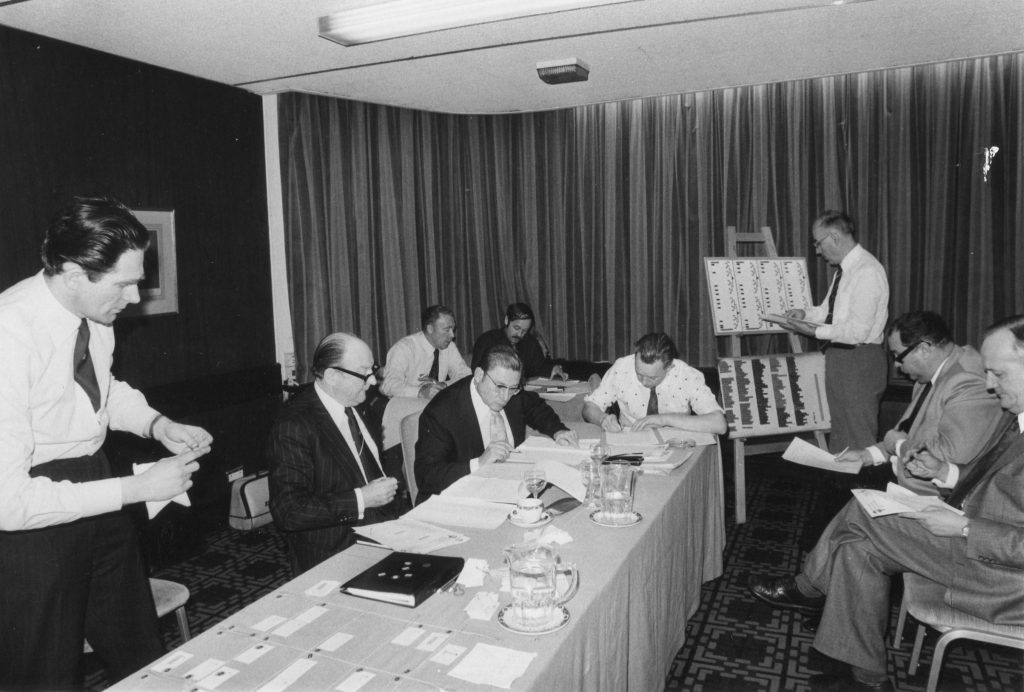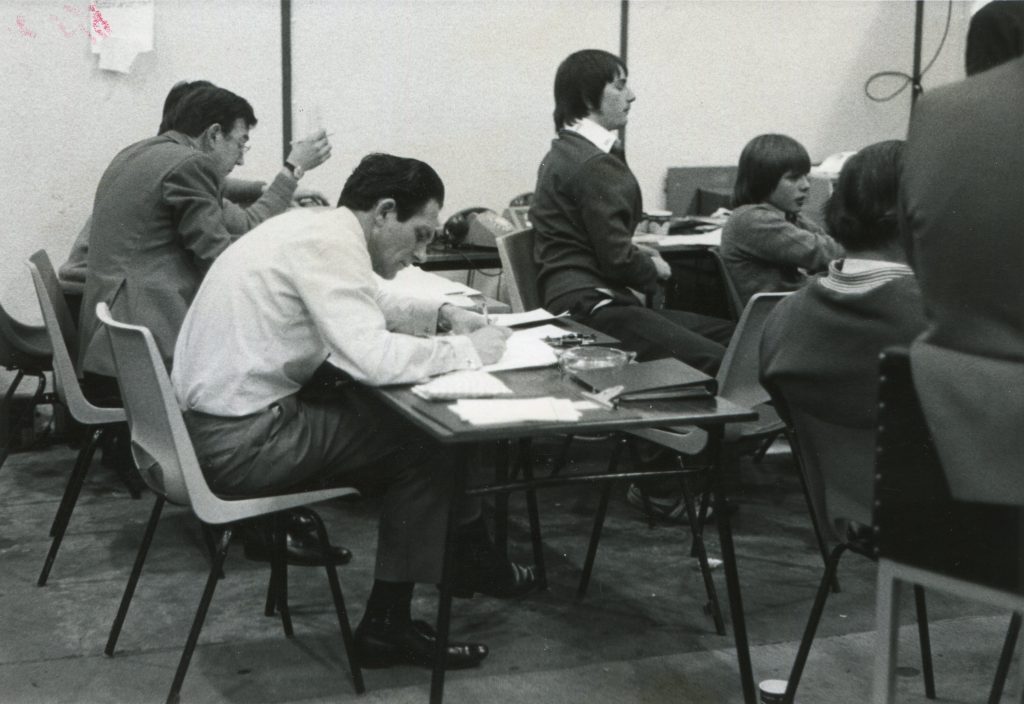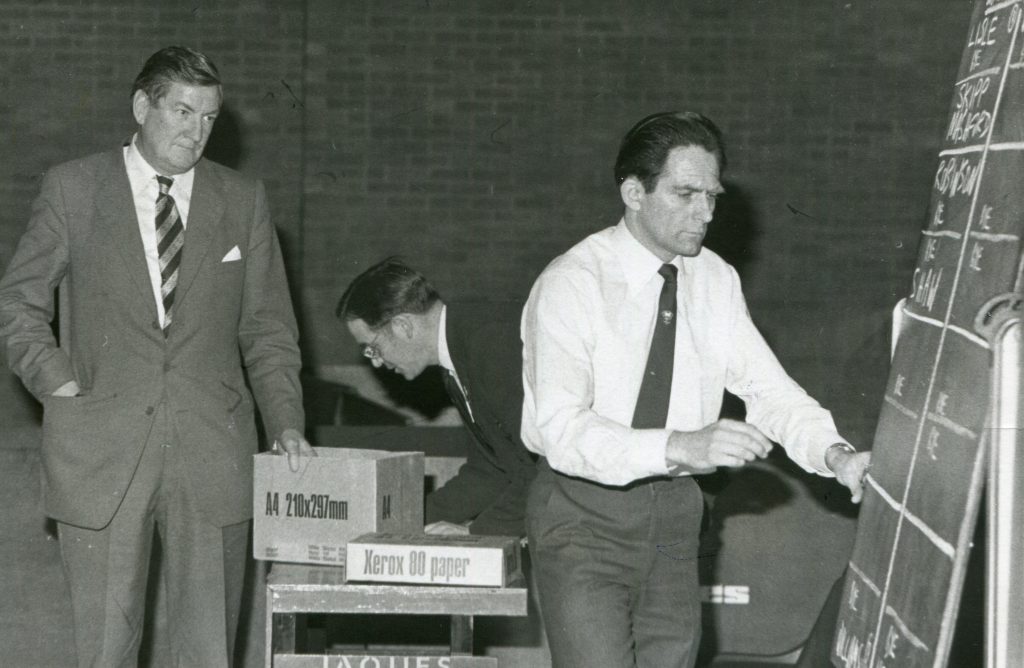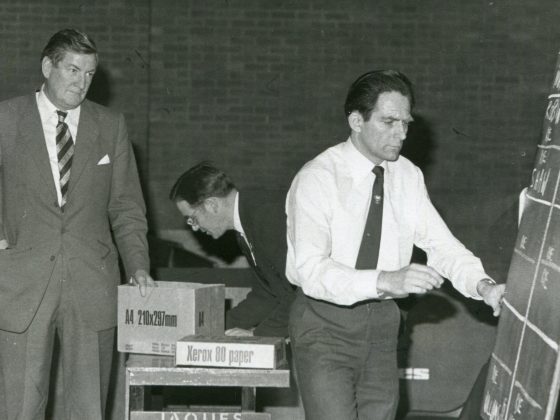From a chance conversation at Acton Town Hall to becoming the foremost official in world table tennis 20 years later – that is the unusual journey of 1977 World Championships referee John Wright.
John, now 88, took charge of the 1977 Championships in Birmingham, the sixth time England had hosted the Worlds and the first outside London.

His route to get to the top of the officiating tree is a story of being in the right place at the right time and a willingness to say ‘yes’, as well as an unflappable temperament.
John admits he had no real background in the sport, playing only on an ad-hoc basis while at school. But that all changed when he took his mother to a concert at Acton Town Hall in November 1956.
“In the box office was a man called Brian Webb,” said John. “We were at school together, though we weren’t particularly friends, and as we chatted he mentioned table tennis.
“He was secretary of Acton Nalgo fourth team and they were struggling at the bottom of the bottom division of the North Acton League and looking for a third player.
“I said I’d played a bit at school, so I was invited for a trial. I went along, we played a few games, and I beat him. It was a business houses league, but each team was allowed one guest player, so I was invited to join.
“We went from bottom of the league at Christmas to runners-up – and it all went from there.”
In fact, it went from there quite quickly. Brian was the league treasurer and invited John to join the committee, and within two or three years, he was secretary.
By 1961, he had qualified as a County Umpire and, as his circle of table tennis friends and acquaintances widened, more opportunities opened up – taking on the role of Middlesex County Umpires Secretary and then joining the County Championships Committee as Secretary and then Administrator, a role he held from 1964-76. He later also became publicity officer.
A maths teacher at Kingston Grammar School, he was also involved in schools competitions in both Middlesex and Surrey and by 1965 had become a National Umpire.
It was the 1966 European Championships, in London, which accelerated his path to the top of the world of officiating.
John says: “They needed a committee for the Championships and I was doing reasonably well as Administrator of the County Championships, so Conrad Jaschke (ETTA management committee) asked if I would like to do it – and like a fool, I said yes!”
“I asked to go on the referees’ committee because I knew Geoff James and thought It would be working with him as he would be referee. But he counted himself out, so they brought George White out of retirement to be referee.
“The Championships went off pretty well and I was asked if I’d like to get involved with producing the programme for the English Open, so I went along to the first committee meeting as programme editor. They had no referee as George White had made it clear he only came out of retirement for the Europeans – and to my astonishment, he recommended me as referee, even though I’d never refereed any sort of competition whatsoever apart from local league.
“So, because there was nobody else, I became referee of the English Open. From the most modest of starts in North Acton 10 years before, going to the English Open, which I thoroughly enjoyed.”
The English Open was a high-class event, akin to the WTT Star Contender tournaments of today, attracting some of the best players in the world.
John said, with help from old hands on the referees’ desk, such as Frank Milligan and Percy Hyde, he made a successful transition to refereeing.
“They had been on the referees’ desk there for years and they both helped me a great deal,” he said. “And I was always kindly treated by the headmasters at Kingston Grammar, who gave me time off to go down to Brighton to run the championships and to do the preparation work for the draw.”
With thinking turning to the 1977 Worlds in Birmingham, John added: “I must say I’d made a pretty good job of the English Open, and there weren’t that many people around at that time, so I was asked to do it.
“There were nerves of course, but I suppose having done the English Open for about 10 years I managed to take it in my stride quite well.

“One of the things I learned was that the foreign teams didn’t seem to mind being moved from a scheduled table to another one, provided you asked them – if you told them, they weren’t nearly so happy.”
John remembers a successful tournament – though, as is to be expected at any Worlds, there were moments of controversy.
“One of the big things was when I had to go on court and ceremoniously disqualify a Chinese player,” he remembers.
“It wasn’t as big a thing as it might sound – it was a lower-ranked Chinese player and it was because they weren’t going to be allowed to play against an Israeli because Israel did not exist, said the Chinese captain.
“So, I had to go on court, call their name out and disqualify them when they didn’t turn up.
“There was also a bit of a fuss about the North Korean bats, I forget exactly what it was but I had to speak to them and get them to change something. I was promised if I was to go to North Korea, I would get a warm reception – I imagine their definition of warm was different to mine!
“I think those were the most controversial things, it all went off very well.”
John remembers Doreen Stannard, Harvey Webb, Fred Groom and Len Pilditch as playing key roles in helping the Championships run smoothly.
“I’ve known Doreen since 1957 or 58,” he said.” She was Umpires Control at the Worlds and we had Harvey Webb and Fred Groom and Len Pilditch too – they did a lot of work behind the scenes.”
He also mentioned the calling of service faults against a couple of the Chinese players who reached the finals – a matter that was criticised by then ITTF President Ivor Montagu, who lamented a lack of discretion on the part of the umpires in an essay published by Table Tennis News magazine after the Championships.
John’s response in the following month’s magazine was as succinct as Montagu’s criticism was verbose, defending the umpires and the letter of the law.
That was not the only matter taking his attention once the Worlds had finished – later that summer, he and his fiancée Cynthia were wed.
They remain married and John said: “Cynthia was admin secretary at the ETTA and took minutes at the meetings. We went for a meal one late afternoon after a meeting and it all went from there.”
He was also awarded Honorary Life Membership of the then ETTA the same year. “It was and still is the biggest honour that can be given in English table tennis,” he said.
Although he continued to contribute to English table tennis after that, sitting on the Board of Appeal and Standing Orders Committee and acting as an election scrutineer, the World Championships of 1977 was his apex in the sport and he largely stopped refereeing soon afterwards.
With refreshing honesty, he said: “Having done the Worlds, there wasn’t much for me to do, and things became a bit of an anti-climax. I found I wasn’t putting as much care and attention into the preparation (of other tournaments) – they still went off very well, but I hadn’t prepared as thoroughly.”
Still, refereeing at a home World Championships was pretty special, and it is clear he garnered the respect of the table tennis community during that journey from North Acton to Birmingham.
He said: “I tried to be as fair as I could all the time and I believe I was quite widely respected throughout the country for the way I handled things.
“I never looked at it in terms of being the top official in the world but, yes, I think that’s fair to say at that time.”
And his advice for those who aspire to undertake a similar journey?
“Try to get on good terms with the captains of the various teams and use your common sense.”






